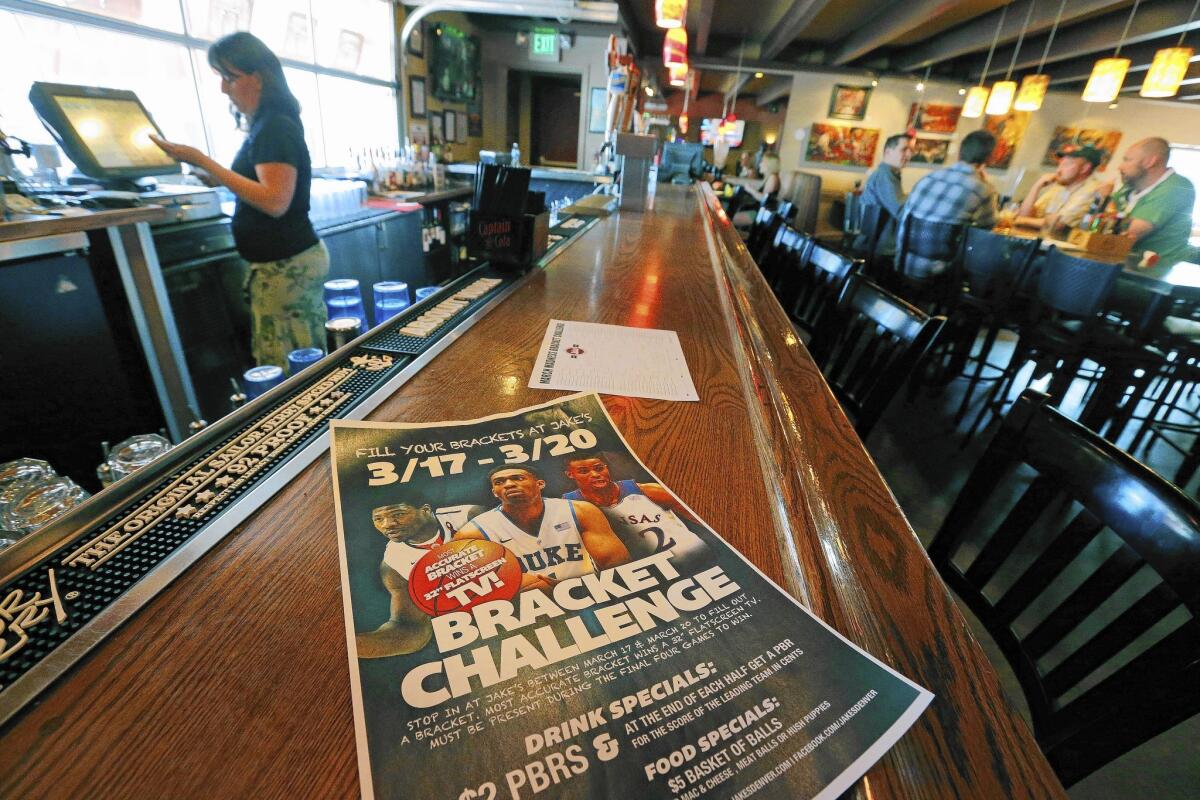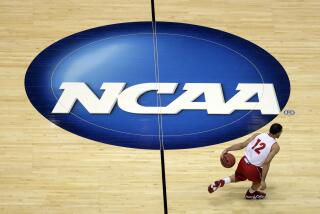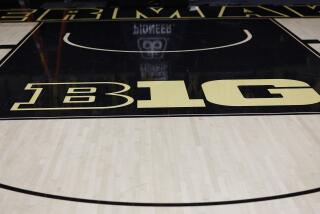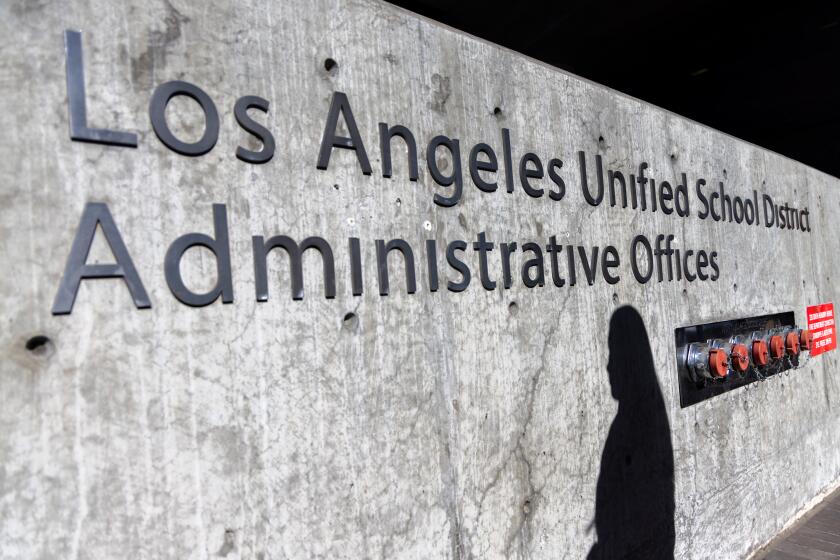The man who created phrase ‘March Madness’

When Henry V. Porter died in 1975, funeral notices mentioned his induction to the Naismith Memorial Basketball Hall of Fame as one of the game’s pioneers.
Back in the day, Porter had pushed to adopt a ball without laces to make it substantially easier to dribble. And those fan-shaped backboards that are common on schoolyards and playgrounds? Porter designed them.
The obituaries also mentioned that he led the band and orchestra at Athens High in central Illinois, and that for decades he worked as an executive for state high school athletic associations. They even mentioned that he did not have children.
FOR THE RECORD:
NCAA basketball: An article on the evolution of the term “March Madness,” now used to describe the NCAA basketball tournament, in the March 20 Section A said that the term was first printed by Henry V. Porter, relating to the Illinois high school basketball tournament, in 1939. Although Porter is widely credited, word historians have found earlier references regarding March Madness being used to describe the annual high school basketball tournament in Indiana.
What they did not mention was March Madness — the term Porter created and NCAA turned into a money machine.
March Madness is now the colloquial name for the annual showcase that determines college basketball’s champion — three weeks filled with buzzer-beaters, Cinderella teams, office pools and distracted workers.
There are 64 teams remaining in the tournament, with legions of followers hanging on every rebound and free throw. Last year, ESPN’s bracket contest — in which fans predict the winners for each game — generated 8.15 million entries. Even President Obama filled out one this week.
The madness has been a windfall for the NCAA, prompting dozens of cease and desist letters mailed each spring to those who might infringe on those two words the organization guards with religious zeal.
Porter and his descendants, however, received no share of the bounty.
At the Buehler Home retirement community in Peoria, Ill., where three of Porter’s closest surviving relatives live, there’s only a vague conception of the swirl of conflict and cash around the name. Last March, Shirley Meagher, her sister, Lauralee Randolph, and their cousin, Carl Porter, tacked a few newspaper articles to a bulletin board to let neighbors know about their uncle’s invention.
No one paid much attention.
But the slender book containing the two words that launched lawsuits and generated billions of dollars isn’t far from Meagher.
The volume Porter self-published in 1939 is coated in faded orange, Meagher, 91, says over the phone. A handwritten inscription rests inside: “To mother and dad to show how the boy has been spending some of his spare time.”
Among the essays and poems is the basketball-mad prose Porter penned to celebrate fans of the Illinois state high school basketball tournament. First printed in a magazine he edited, the words ushered March Madness into our lexicon.
“When the March madness is on him,” Porter wrote of the rabid basketball supporters, “midnight jaunts of a hundred miles on successive nights make him even more alert the next day.”
Meagher seldom watches television. She’s never filled out an NCAA tournament bracket and doesn’t follow college basketball closely. But Porter isn’t far from her thoughts when March arrives.
“He was a very modest man,” Meagher said. “I think he would’ve laughed. I think he would’ve gotten a kick out of it.”
Then she added: “I don’t think he ever took money for any of those things.”
Others did. March Madness became the nickname for the Illinois high school basketball tournament in the 1940s; the Illinois High School Assn. made it official in 1977 and licensed the phrase to companies such as Pepsi and Wilson Sporting Goods. Other states could use the name for their tournaments for a $10 fee.
“We just naturally used that term,” said Scott Johnson, the Illinois association’s unofficial historian. “It kind of stuck.”
The name jumped from Brent Musburger’s lips and into the mainstream in March 1982. Calling the NCAA tournament for CBS, he uttered the phrase he heard covering high school sports as a reporter for two Chicago newspapers. Sports Illustrated and United Press International used the term in articles that March, as well.
Basketball-obsessed Chicago businessman Charles Besser picked up on the name. His company, Intersport, produced the one-hour “March Madness Coaches Show” previewing the tournament on television.
No one had trademarked “March Madness.” Besser did so in 1989. The reasons behind registration No. 1571340 ran deeper than protecting an asset.
“I was a complete basketball nut on the edges of basketball craziness,” Besser said. “If I hadn’t have been so in love with college basketball I wouldn’t have thought of doing it.”
That trademark touched off a two-decade legal tussle over who controlled the two words. The NCAA began licensing use of the term in 1988 and in November 1993 sent its first cease and desist letter to the maker of a trivia game that planned to include March Madness in the title.
After a brief partnership, Intersport assigned its rights to the Illinois High School Assn. in 1995. Intersport retained the ability to use the name in certain circumstances. Then the NCAA and Illinois association sparred over the name for the next five years until they pooled their rights in 2000.
The Illinois association eventually surrendered its ownership stake, but retained the high school rights. The NCAA bought out Intersport’s license for $17.2 million in 2010.
“It’s a little bit of a metaphor,” said Douglas Masters, Chicago-based outside counsel for the NCAA. “It captures something that resonates with people. It has that kind of power.”
Porter’s coinage is one of the most-used elements in the NCAA’s arsenal of trademarks. The slogan once inspired by fans crammed into Huff Gymnasium at the University of Illinois to watch high school basketball now includes derivatives such as “Munch Madness” and “Print Madness” to hawk things such as chips and shipping.
When March’s bracket-driven frenzy arrives each year, Masters and associates prowl for uses that infringe on the trademark. The NCAA is a regular customer in front of the U.S. Trademark Trial and Appeal Board to swat away unlicensed attempts — Live the Madness, March Radness, Midnight Madness — to use permutations of the name.
“The collective value of March Madness to the NCAA cannot be understated,” one sports media consultant wrote in a January court filing in an unrelated lawsuit against the NCAA.
The consultant meant that the cash connected to the tournament that comprises the vast majority of the NCAA’s annual income. In 2010, CBS and Turner Sports paid the NCAA $10.8 billion for 14 years of rights to broadcast the tournament.
The FBI estimated $2.5 billion is illegally wagered during March Madness. One contest offers $1 billion for a perfect bracket.
A mathematics professor at DePaul University calculated 9.2 quintillion combinations in the 68-team bracket.
At the retirement home in Peoria, Ill., March Madness is one more creation by an uncle remembered for shooting home movies at family gatherings. Leading efforts to promote sportsmanship and codify rules for high school basketball and football. Playing the violin and mandolin. Encouraging writing. Meagher laughed about the frequency the phrase appears in advertising these days.
She recalled visiting the Naismith Memorial Basketball Hall of Fame in Springfield, Mass. — her uncle entered with John Wooden in 1960 — and alerting staffers that Porter’s biography didn’t include one mention of March Madness.
“I told them they need to correct that,” she said. “I don’t think they were terribly impressed.”
More to Read
Sign up for Essential California
The most important California stories and recommendations in your inbox every morning.
You may occasionally receive promotional content from the Los Angeles Times.











